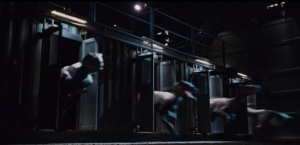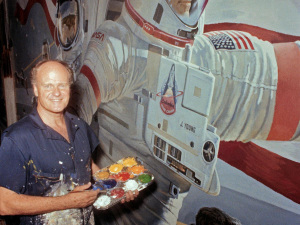Steven Lyle Jordan's Blog, page 36
November 30, 2014
Gordon House
Hard to believe anyone would want to destroy this house for any reason.
 Originally posted on the numinous cosmos:
Originally posted on the numinous cosmos:
My wife and I recently had the privilege to visit the only “open to the public” Frank Lloyd Wright house in the Pacific Northwest. The home, known after its original owners as the Gordon House, is located at 869 West Main Street in Silverton, Oregon. The house is located in a public garden where it was removed to in 2001. The home was originally sited along the Willamette River in Wilsonville, however, the family sold it in 2000 to people who wanted to demolish the home (as seems to be the case with most Wright’s homes- ostensibly to build some Mcmansion monstrosity).
The Frank Lloyd Wright conservancy arraigned to buy the house for a dollar as long as they took it off of the property. It was dismantled and reconstructed as close to the original specifications as possible.
The home itself was designed by Wright in 1957, built in 1963, and is…
View original 420 more words

Science (fiction) doesn’t have to be believable?
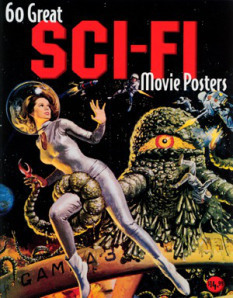 I recently encountered a Facebook post by an author of a science fiction novel based around the idea of global cooling. He had discovered a website of climate theorists, the Space and Science Research Center, whose opinions roughly matched those of his book, and was proud to point out the connection.
I recently encountered a Facebook post by an author of a science fiction novel based around the idea of global cooling. He had discovered a website of climate theorists, the Space and Science Research Center, whose opinions roughly matched those of his book, and was proud to point out the connection.
Unfortunately, the SSRC is an avowed anti-warming group, whose theories are not backed by actual scientific data:
“The Space and Science Research Center (SSRC) is (apparently) a for-profit company located in Orlando, FL. They appear to have an anti-global warming agenda, though their arguments have yet to be examined in detail. They present an appearance of scientific grounding, but they do not seem to have any peer-reviewed papers on their theories.” (From Issuepedia)
I politely pointed this out, and added that “although it’s nice to take your SF from the headlines, one should caution whose headlines are being read…”
However, my point was essentially ignored by other posters, including the author, all of whom expressed little or no concern about whether the science in the story was actually correct. One such poster lauded the author, and added:
“I suspect your book will be much better fiction than anything peddled by the SSRC. Science does not have to be believable, as long as your characters are.”
When I read that, a small part of me died inside.
I (apparently) represent a dwindling number of science fiction authors who believe that the science in science fiction is important enough to take every effort to make it not only believable, but as far as we can determine, possible. We put considerable effort into researching our science and technology, crafting our stories around as plausible a series of scientific details as we can work out.
But it also seems to be true that the majority of science fiction consumers out there will bitch endlessly about the scientific accuracy of Interstellar… but will pee themselves watching the latest Star Wars trailer. That they don’t care how impossible it is to fly through space faster than light… it’s so cool that they want it anyway. That Cal-Tech physicists working as scientific advisers don’t have the same cred as talking trees and raccoons.
This is distressing—and not just because it means people aren’t buying my books; it means that growing segments of the public do not know or care about science or how it works. And as it takes knowledge of science and how it works to actually work in scientific fields (assuming your goal is not to blow yourself up or contaminate the planet), it means that the future of our scientific progress is looking very bleak.
Talk to today’s scientists and rocket experts, and what you hear from them is a list of science fiction television shows and books that inspired them to get into science. That list includes work by authors who knew a lot about the science they wrote about, and endeavored to not only inspire, but teach their readers about the world around them. You won’t hear many of them wax enthusiastic about the Shatner-vs-Gremlin episode of The Twilight Zone, or any episode of Lost in Space; you will hear them speak glowingly of the technology presented in Star Trek and 2001: A Space Odyssey, and of authors like Clark, Asimov, Bova and Pohl.
Sure, you can have your entertaining sci-fi with no real science; your Star Wars, Godzillas, ETs and Guardians. But the real value of science fiction comes in its examination of the possibilities and pitfalls of science and technology, and how it will impact our real lives.
I really don’t care to know that some kid learned defensive light-saber techniques from me… because exactly who is that going to benefit? But one day, I’d like to know that one of my books was part of the library of works that inspired a future scientist to improve our energy systems, artificial intelligence or off-planet life support systems. I’d like to know I helped inspire someone to design a better waste management system, a more efficient jet engine, a more intuitive cellphone interface or a longer-lasting battery.
Because that’s the real power of science fiction. Any genre can entertain; but science fiction can inspire people to learn about real science and technology, and find ways to make life better.
Though I admit I’ve written series of sci-fi novels where scientific accuracy takes a back seat to entertainment… my proudest accomplishments are those stories where the science is as believable and accurate as possible, and still rocks a great story. It is not an impossible feat; and it’s one that we should be striving to expose more people to, for the sake of our mutual future.
We should not encourage willful ignorance. We can, and must, do much, much better than that.

November 29, 2014
This is what it takes
 Jezebel relates a story of how a harassed reviewer dealt with her harasser:
Jezebel relates a story of how a harassed reviewer dealt with her harasser:
It’s a story as old as, well, the Internet. A woman is a video game journalist. She receives rape and death threats. The end. But in a delightful new take on the old story, said video game journalist has reached out to the mothers of her harassers, just to let them know what their sons are up to.
Simple solution, and surprisingly effective. Once the parent knows what the son is doing, the offending behavior stops cold.
I’ve said before that the element of anonymity may be the worst thing that has ever happened to the Internet (at least, in countries where unprovoked political arrests are not common). Anonymity allows people to do what this harasser does. Taking away that anonymity generally takes away the harasser.
And the stalker.
And the spammer.
And the phisher.
And the troll.
No, this is certainly not going to solve all the evils of the world. Not all parents are going to react properly when they find out their sons or daughters are doing. But in a world where people feel free to act like assholes because they hide behind digital masks, better internet transparency—and much less web anonymity—are in order.

November 28, 2014
aka Desperate Author’s Day
 So, you’ve just thanked the heavens for all the things you’ve got… then prepped yourself to run out and buy even more stuff at the big box stores? Well, if you have any energy (and stamina) left, give a thought to Small Business Saturday, when all small, family-owned and local businesses hope for some spending love. And what business is smaller than the (a-hem) independent author?
So, you’ve just thanked the heavens for all the things you’ve got… then prepped yourself to run out and buy even more stuff at the big box stores? Well, if you have any energy (and stamina) left, give a thought to Small Business Saturday, when all small, family-owned and local businesses hope for some spending love. And what business is smaller than the (a-hem) independent author?
Yes, Independent authors like myself do everything we can to entertain you and your friends. We do all the work of conceptualizing our products—doing the researching and prep, writing the story—packaging it—creating (or buying) cover art—promoting it through websites, social media and ads—uploading it into bookselling sites like Amazon and Barnes & Noble—and hoping against hope to be discovered by you, our wonderful readers. We work hard, to give you pleasure!
So, we politely beseech you to give us a thought after you’re worn out from beating back the throngs at the quarter-price Beats headphones table: On Saturday, sit yourself down, have a nice drink, welcome your favorite pet onto your lap, and buy something to support your friendly neighborhood small business author from the comfort of your computer, tablet or cellphone.
Of course, if you don’t want to wait for Saturday, I hear Friday has been declared Buy Black Friday… so hey, do a brother a solid.

Sir Isaac Newton vs Bill Nye: Epic Rap Battles of History
November 26, 2014
Jurassic World promises to be a… horserace?
Yes, the first trailer for Jurassic World has been released!
And as much as I enjoyed it, I got the greatest kick out of what we saw at the end:
…which immediately led to this exchange on IO9:
Steven Lyle Jordan
Aaaaaannndddd… We’re off!
imaginaryfryerfire
…and Teeth For Days has taken an early lead – but here comes Captain Hookedclaw on the outside!
Steven Lyle Jordan
…Followed closely by Clever Girl, Rex Bait, Republican Party, Snap Dragon, Bovine’s Nightmare, and… Beetlebaum!
SeaGirl
You get extra stars for Beetlebaum! (‘Cause I’m old…)
Forsaken18er
Haha I’m glad to see someone else thought of Clever Girl.
JakeSjet
Oooh! And there they go around the first corner with—Wait! Republican Party and Snap Dragon have stumbled on the corner! They’re tearing into one another in a clear sign that Nokia should have paid more attention to training than lathering sponsors onto their raptor.
JimKakalios
Whillemina in the lead, Rum-Rum second, Apartment Building with plenty of room, Mother-in-Law nagging from the rear. And here comes the winner………..
Beetlebaum!
JimKakalios
Did not see when I posted my comment that I was scooped on the Beetlebaum joke by about three hours. Well played. Serves me right for riding one of Bing Crosby’s horses!
(What can I say? It’s the little things in life! Thanks, Spike.)

November 25, 2014
Robert McCall, inspirational master of the space painting
Gizmodo has posted a fantastic series of 27 works from the master of space painting, Robert McCall. McCall’s realistic, documentary-style paintings have been seen on everything from Hollywood posters (most notably for 2001: A Space Odyssey) to promotional materials by NASA. And this set doesn’t include my personal favorite, Apollo On The Moon, depicting a lunar lander and astronaut standing on the Moon, with Earth in the background.
For those young’uns of you: These are among the most inspirational visual works depicting space and space exploration of the 1960s and 70s, the paintings that turned many a child’s eye inexorably skyward… including my own.

November 22, 2014
What always beats privacy?
 For years, scientists, media, politicians and public citizens—hell, pretty much everybody—has been cautioning screaming about the pervasive and invasive tendencies of the digital revolution, its inexorable collection of data related to every aspect of our lives, the erosion of personal privacy and the eventual collapse of civilization that will result. Yet, when laws and regulations are proposed to rein in this collection of data and loss of privacy, they are always delayed, watered down or struck down… and often by the very people who decry the loss of privacy in the first place.
For years, scientists, media, politicians and public citizens—hell, pretty much everybody—has been cautioning screaming about the pervasive and invasive tendencies of the digital revolution, its inexorable collection of data related to every aspect of our lives, the erosion of personal privacy and the eventual collapse of civilization that will result. Yet, when laws and regulations are proposed to rein in this collection of data and loss of privacy, they are always delayed, watered down or struck down… and often by the very people who decry the loss of privacy in the first place.
Why is it that people who are so concerned about their personal privacy can’t seem to prevent others from getting their data? Because that’s not what we really want.
What we want is cheap gas. What we want is more of our favorite flavor of latte at the barista. What we want are shorter wait times at the cashier. What we want are customer service people who can present us with just the products we like and the brands we prefer, none of the things we can’t wear or don’t look good on our wall or don’t smell right. We want computers that go to our favorite websites, applications that remember exactly where our most used files are stored, and passwords we don’t have to enter by hand.
Humans are ruled by convenience. It’s part of our DNA: Make life easier. And we will move heaven and Earth to make it so. Convenience beats privacy, hands down, drop mic, go home.
Sure, there are people who manage to resist the temptation to accept convenience at the cost of some privacy. But few of those people manage to resist every temptation. And some of us have no choice: If your job requires you to punch a clock, or use an entry fob to get into your building, you are allowing employers to know your comings and goings for the convenience of taking home a paycheck.
Convenience is built upon trust, something we all want to have towards the people and things we deal with (something else that’s in our DNA). In order to trust something, we invest in gathering some information about it, to learn about it, and in the worst case, to know where to find it if something happens. Having that trust benefits us, as it makes our dealings with the world safer and more predictable. And it works both ways; we will volunteer information about us, so others can trust us and therefore interact safely with us. This is the way humans want the world to work.
It’s just unfortunate that other humans, knowing this, can easily exploit our desire for convenience to steal from us.
 So what would it take to turn people against all of these privacy-threatening conveniences? Simple: They have to become very, very inconvenient. And I don’t mean inconvenient like, “Target hackers got my credit card info and someone paid for a dress with my money.”
So what would it take to turn people against all of these privacy-threatening conveniences? Simple: They have to become very, very inconvenient. And I don’t mean inconvenient like, “Target hackers got my credit card info and someone paid for a dress with my money.”
I mean inconvenient like, “Target hackers got my credit card info, and all my credit is gone.” “Sears hackers got my bank info, my bank account was zeroed out, and the FDIC won’t reimburse anything.”
As in people’s credit, ruined. Loans cancelled and outstanding balances due today. Mortgage payments gone. Taxes unpaid. Cars repossessed. No money for food or medicine. Paychecks gone. Lives destroyed. Lives lost. Society’s trust turned into utter soul-crunching chaos.
And just so we’re clear, there’s absolutely nothing stopping hackers from doing exactly this. Only their sense of discretion has kept them making small attacks, allowing them to siphon money in dribs and drabs as desired. But sooner or later, someone will decide to make one big score… and any one or many of us could find ourselves instantly wiped out.
And, unfortunately, it won’t be until someone is inconvenienced by being totally wiped out will they worry about improving security and ensuring privacy for all.


November 16, 2014
Space Opera: It’s the (stupid) science
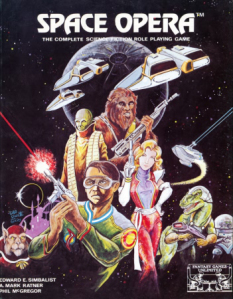
The trappings of space opera are beautifully illustrated here.
The recent arguments over the merits of Interstellar (is it good SF, is it crappy, is it too serious, is the science BS, etc, etc) has been ringing in my ears this week. One poster even tried to label Interstellar as space opera. Which reminded me of a post in IO9 a few months back about space opera and its merits. Part of the discussion revolved around what, exactly, is considered space opera.
I mean, I thought that it was pretty much a given what “space opera” is considered to be. Star Wars. Buck Rogers. Lensman. Dune. But then a few posters called that view “old school” and tried to suggest other movies and books that qualified as space opera. One, in particular, that was mentioned to me was S.A. Corey’s Leviathan Wakes, part of the Expanse series. Author George R.R. Martin himself called the book “kickass space opera” (it’s on the cover).
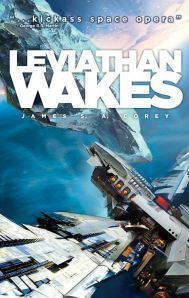
Science fiction. NOT space opera. I don’t care what George R.R. Martin says.
I’d heard of Leviathan Wakes, and had it on my “possible to-read” list, but had never committed to it. But as it was now pseudo-recommended to me as, essentially, “the new space opera,” I decided to give it a read. And having finished it, all I can say is that it’s not “space opera,” in any sense.
Does this mean some people (including GRRM) don’t know what “space opera” is? Or that the basic definition of “space opera” has changed? I say it’s the former. If people are calling books like Leviathan “space opera”… they’re wrong.
I know. I just said George R.R. Martin is wrong. Seriously, bear with me.
Space opera is a particular kind of science fiction that is more concerned with the drama than the setting, and uses the concept of science and the future as a flat backdrop for the story. Star Wars (the three original movies, specifically) is a perfect example of space opera, in its overriding theme of revolution, small bands of rebels with very little chance against a massive and powerful evil empire, and the magical savior that makes their ultimate victory possible. The story takes place in space and on various planets, but there is no connection to real science: Ships can travel faster than light, move in space as if there is an atmosphere, shooting at each other and creating fiery explosions; gravity is easily controlled; aliens that look nothing like humans can nonetheless breathe the same atmosphere and converse in English (or just auditorially); weapons include blasters and light-sabers, and a mysterious mystical thing called The Force.
Contrast this with Leviathan Wakes, in which: Humans (and humans only) travel about the Solar System in trips that can take weeks to months, because no one can travel faster than light; acceleration to high velocities means people must take drugs to keep their hearts from bursting; unless ships or habitats in space decide to rotate to create artificial gravity, there is no gravity; weapons are lasers, projectiles or missiles; radiation can kill you; resources have limits; radio messages travel no faster than the speed of light; nobody has super-strength, mind-reading abilities or power rings; and the big deal of the story is the discovery of the first indication of life from anywhere else in the cosmos.
The difference is clear: Star Wars is full of pretend-science, clearly unreal and (quite probably) downright impossible technology, creatures and physics—the impossible made possible by handwavium, which they literally do when applying The Force upon susceptible minds (“These aren’t the droids you’re looking for”). This is what makes Star Wars “space opera.”
Leviathan Wakes is full of real science and technology that obeys the laws of physics and our knowledge of the universe. Leviathan is set in the kind of world that authors like Arthur C. Clarke, Ben Bova and Frederick Pohl write about. The kind of future that you and I, if we could live long enough, could actually live in. Sure, you can debate the accuracy of some of the technology they feature—it hasn’t been invented yet, after all—but it’s all based on sound scientific principles. Despite G.R.R. Martin’s accolades, Leviathan is serious science fiction… not “space opera” at all.
Of course, I know some people who believe that science will eventually accomplish everything we can imagine. I can hear them saying: “It’s all in the future, and we can’t know what’s impossible, therefore, all of that science is possible.” Since they see all science as ultimately possible, they see no distinguishing features between, say, 2001 and Dune. So, they assume, the difference must be in the story: Only space opera has “romantic, often melodramatic adventure, set mainly or entirely in outer space, usually involving conflict between opponents possessing advanced abilities, weapons, and other technology.” (Wikipedia)
Not so. Those same high-minded concepts are cornerstones of all kinds of “serious” science fiction, from The Andromeda Strain to Voyage from Yesteryear, from Coyote to Firefly (and including Interstellar). There is no difference in the kind of stories told in science fiction and space opera. Both genres feature good challenging evil, melodrama, romance, comedy, excitement and action.
There is nothing left but the science—the element that is either a realistic landscape that impacts how the story is told, or a cheap curtain that contributes nothing to the story besides background color. Just like soap opera, Space Opera completely ignores science and the world around it, and creates stories that lack realistic grounding. Science fiction often cannot tell its story without science’s realistic grounding; it creates a story that does what it does, while being chained to reality and its rules.
So, let’s get these definitions straight, or we’ll never be able to agree on what’s what and what we like. To put it succinctly: Science fiction is the science, stupid; Space opera is the stupid science.


November 14, 2014
Advertisement: Take 2
 I’m giving consideration to placing ads in some upcoming science fiction convention programs/promo books. I say “giving consideration,” because the last few times I’ve tried to promote myself at conventions, it hasn’t worked out. At all.
I’m giving consideration to placing ads in some upcoming science fiction convention programs/promo books. I say “giving consideration,” because the last few times I’ve tried to promote myself at conventions, it hasn’t worked out. At all.
Most recently, there was a query I sent to an upcoming convention about sending an add. They lost me email for a month, then “found” it and contacted me with 2-3 days to produce an ad and send it to them. Since I didn’t want to rush an ad that would be half-assed and probably unsuccessful, I had to blow them off. Other conventions didn’t even answer my queries.
Before that, I went to AwesomeCon, hoping that an appearance as a panelist would get me a promo boost. It did nothing. (Okay, it was primarily a comic book crowd, heavier on fantasy than science fiction… but still, not even a few token sales. Zip. Zero. Zilch. Nada.)
Before that, I prepared 500 full-color promo cards to go into the swag bags of every convention-goer at Balticon. The entire box of cards was lost by Balticon staff before going into the bags. (I should have sued to recover my production costs.)
Needless to say, convention promotion has not been very good to me.
I’ll decide in the next few days, which will give me about 2 weeks to get my first ad prepared (using material from the promos I’ve prepared for this blog). Anyone reading this who has an opinion on the efficacy of convention promo ads, now’s the time to let your voice be heard.






